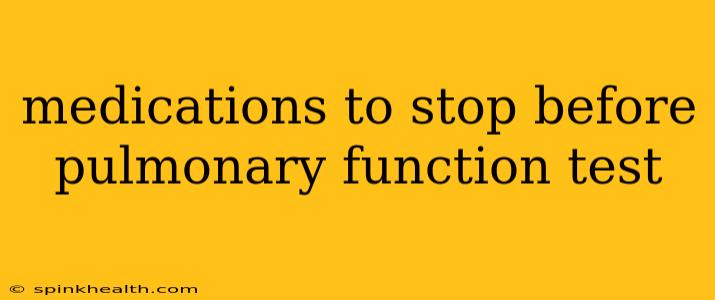Medications to Stop Before a Pulmonary Function Test: A Comprehensive Guide
The air we breathe, the very essence of life, is something we often take for granted. But for those facing respiratory challenges, understanding lung function is crucial. A pulmonary function test (PFT) is a cornerstone of diagnosing and managing lung diseases. However, certain medications can significantly affect the results, leading to inaccurate diagnoses and potentially flawed treatment plans. Therefore, knowing which medications to stop before a PFT is vital for ensuring accurate and reliable results. This isn't just about following a doctor's instructions; it's about ensuring you receive the best possible care.
My journey into understanding this started when my grandmother, a vibrant woman who always loved her garden, began experiencing shortness of breath. Her doctor ordered a PFT, and it was then that I learned about the crucial role of medication adjustments before the test. This experience ignited my interest in the intricacies of pulmonary function testing and the importance of accurate results.
What is a Pulmonary Function Test (PFT)?
Before we delve into which medications to avoid, let's briefly understand what a PFT entails. A PFT is a non-invasive test that measures how well your lungs are working. It assesses various aspects of lung function, including:
- Forced Vital Capacity (FVC): The total amount of air you can forcefully exhale after a maximal inhalation.
- Forced Expiratory Volume in 1 second (FEV1): The amount of air you can forcefully exhale in the first second of the FVC.
- FEV1/FVC Ratio: The ratio of FEV1 to FVC, which helps diagnose obstructive and restrictive lung diseases.
- Peak Expiratory Flow (PEF): The maximum speed of air you can exhale.
These measurements help diagnose conditions like asthma, COPD, cystic fibrosis, and other respiratory illnesses.
Which Medications Need to Be Stopped Before a Pulmonary Function Test?
This is where precision is paramount. Several medications can artificially inflate or deflate lung function readings. The specifics depend on your individual health and the medications you're taking, so always consult your doctor or respiratory therapist. They will provide tailored advice based on your medical history and the specific test being conducted. However, some commonly mentioned medications include:
1. Bronchodilators:
- Why they affect PFTs: Bronchodilators, such as albuterol (Ventolin, Proventil) and ipratropium (Atrovent), open up the airways, leading to artificially improved lung function readings.
- How long to stop: Your doctor will usually advise you to stop using your bronchodilators for a specific period, typically 4-12 hours, before the test. This allows your airways to return to their baseline state, providing a more accurate reflection of your true lung function.
2. Short-Acting Beta-Agonists:
- Why they affect PFTs: These quickly-acting medications, like albuterol, can temporarily improve lung function, masking underlying issues.
- How long to stop: Typically 4-12 hours, as advised by your doctor.
3. Long-Acting Beta-Agonists:
- Why they affect PFTs: These medications, unlike short-acting ones, provide prolonged bronchodilation, affecting PFT results for a longer duration.
- How long to stop: Your doctor may advise stopping these for a longer period, sometimes up to 24-48 hours, depending on the specific medication and your health status.
4. Theophylline:
- Why it affects PFTs: Theophylline is a bronchodilator that can significantly alter PFT results.
- How long to stop: Consult your doctor for specific guidance; it may require stopping several days before the test.
5. Anticholinergics:
- Why they affect PFTs: These medications, like ipratropium, relax airway muscles, artificially improving lung function measurements.
- How long to stop: Usually 4-12 hours before the test, as directed by your doctor.
H2: What if I forget to stop my medication before the PFT?
This is a valid concern. If you accidentally take your medication before your test, inform your healthcare provider immediately. They might choose to reschedule the test or take the results with a grain of salt, considering the potential impact on accuracy. Honesty is crucial in such situations to ensure the best possible outcome.
H2: What are the consequences of inaccurate PFT results?
Inaccurate PFT results can lead to misdiagnosis, delayed or inappropriate treatment, and unnecessary or harmful medical interventions. This can potentially impact the overall management of your respiratory health, so adhering to your doctor's instructions is crucial.
H2: Are there any other factors that can influence PFT results?
Beyond medications, other factors can influence your PFT results, including your level of physical activity, time of day, recent illness, and even the weather. Your doctor will take these factors into account during the test and interpretation of results.
Conclusion:
The accuracy of a PFT is crucial for effective respiratory care. By understanding which medications to stop before the test and adhering to your doctor's advice, you contribute to achieving the most accurate and informative results. This ensures that you receive the proper diagnosis and tailored treatment plan for optimal respiratory health. Remember, open communication with your healthcare provider is key to a successful and beneficial PFT experience.

